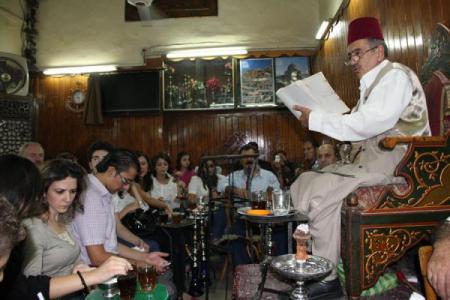DAMASCUS, (ST) – The city of Damascus has always owned a rich popular heritage of stories, proverbs, tales songs, lessons, and jokes that made this heritage, truly, fit the oldest capital city in the world.
Within this vast amount of the Damascene heritage, we find popular beliefs mixed with wit and myth but remained a part of the heritage of the sons Sham (Damascus) for centuries even modernity entered to the march of the city and these beliefs removed away from them to move to the pages of history after it was a daily reality in the lives of the Damascenes.
The researcher, Tamim Ma’moun Mardam Beik, feels that most of the beliefs that inherited by the Damascenes were characterized by wit because they tend to be unrealistic but they were regulating the lives of the people among themselves in a popular heritage rhythm stems from the consciousness and the culture of previously grandparents.
“The method of transferring these beliefs were verbally by repeating what the adults say, especially the Damascene family was living in the same house including the grandfather and children and grandchildren and their spouses and were living their lives in intimacy and solidarity and convey their thoughts and perceptions from the old to the young without constraint,” Mardam Beik explained.
“Some of these beliefs say that it is not allowed to leave scissors open to prevent the quarrel among the members of the family and it is forbidden to leave the shoe inside the house upside down because the quarrel then it will be the most intense, explaining that one of the amusing beliefs say that if one handed a bar soap to another hand in hand, it means that they will dispute but If you set the soap aside and the other took it on the back of his hand, so it is acceptable,” Mardam Beik pointed out.
Mardam Beik tells superstitions related to pessimism and optimism to Damascenes such as placing an individual shoe above the other which indicates that the owner of the shoe will travel and If one itches his right hand it indicates that the person will get money and if one itches his left hand means that he will pay money but if he rubs his eyebrow he will shake hands with someone came from long travel and if his right eye twitched he will hear good news well and if his left twitched he will hear bad news.
“Breaking a mirror or the framework of photos bring pessimism according to the beliefs of the Damascenes and they used to bring with them into the houses or their new shops a mirror and green plant and a Koran to be optimism and if they are bored of a heavy guest, they attach a pin in a broom and if they do not want the return of some visitor, they break behind a jar or spilt water after he leaves,” Mardam Beik added.
He explains the beliefs of the Damascenes regarding the hours of the day and how they feel pessimistic in the hours of the morning and say “Al Sabah Rabah= The morning is profitable” in the sense that who begins his work in the morning, he will win and gain profit and when you say meet the people in the mornings and not in the evenings mean if you go to people in need so be it in the morning, not the evening, pointing out that Damascenes prefer not sleeping before sunset because this inherits insanity according to their beliefs and the sun in the afternoon, as they claim, is hotter and more harmful to health at this time.
He points out that sunset according to the people of Syria was to light the lights and waiting for visitors because the visitor at this time must have to dine with the owner of the house and if he wanted to leave before having dinner, they say to him “the guest of the evening either he has his dinner or sleep this night.
“Some of the beliefs of the Damascenes with respect to days, where they prefer on Friday, they wash themselves, exchange visits, enjoy themselves and attend Friday prayers at the mosque, the Great Umayyad noting that Saturday was unpleasant to them and they fear too much on patients and feel pessimistic of those who died in this day because, they claim, someone of his relatives will die soon after him,” Mardam Beik clarified.
Some beliefs of the Damascenes with respect to days, they hated going to the tailor to make clothes on Tuesday, saying Tuesday is inheritance which means that who makes his robe on Tuesday, he does not dress it for a long time but he will die and someone will inherit it. They also hated Wednesday and they don’t not visit patients and do not ask their relatives about the conditions of their patients and consider Wednesday as a part of the afternoon Tuesday. They preferred the Mondays and Thursdays and considered them a blessing days.
Some of the sons of Damascus city still working such beliefs regarding them as part of their traditions and daily heritage from the memory of their ancestors and they don’t like to forget them though the new generation began to make fun of them, but when they grow up, they will return to take them subconsciously because they remind them with their fathers, Mardam Beik concluded.
Sh. Kh.

